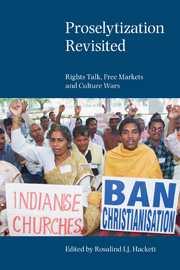Book contents
- Frontmatter
- Contents
- Preface and acknowledgements
- Contributors
- Revisiting Proselytization in the Context of Rights Talk, Free Markets and Culture Wars
- Section I
- Section II
- Section III
- Buddhism and the Politics of Conversion in Sri Lanka
- Merit and the Search for Inner Peace: the Discourses and Technologies of Dhammakaya Proselytization
- Asia's Antioch: Evangelica Christianity and Proselytism in Singapore
- False Consciousness and the Jargon of Authenticity: Religion and Nationalism in the Christianised Lowland Philippines
- Salvation through Secular Protest: the Development of Falun Gong Proselytization
- The Social and Legal Context of Proselytization in Contemporary Japanese Religions
- Section IV
- Section V
- Index
False Consciousness and the Jargon of Authenticity: Religion and Nationalism in the Christianised Lowland Philippines
from Section III
- Frontmatter
- Contents
- Preface and acknowledgements
- Contributors
- Revisiting Proselytization in the Context of Rights Talk, Free Markets and Culture Wars
- Section I
- Section II
- Section III
- Buddhism and the Politics of Conversion in Sri Lanka
- Merit and the Search for Inner Peace: the Discourses and Technologies of Dhammakaya Proselytization
- Asia's Antioch: Evangelica Christianity and Proselytism in Singapore
- False Consciousness and the Jargon of Authenticity: Religion and Nationalism in the Christianised Lowland Philippines
- Salvation through Secular Protest: the Development of Falun Gong Proselytization
- The Social and Legal Context of Proselytization in Contemporary Japanese Religions
- Section IV
- Section V
- Index
Summary
In this essay, I focus on a single site or place called Mount Banahaw in the Philippines. Mount Banahaw is an extinct volcano widely believed, by Filipinos, to be a centre and repository of spiritual power and potency. Since about 1840 it has been a centre of pilgrimage, healing and home to nationalist religious movements, and has also been associated with banditry, anti-colonial armed groups, as well as communist/Maoist insurgents, encounters with UFOs and so-called new age religion. This essay references field work conducted in and around Mount Banahaw among Tagálog-speaking peoples of central-southern Luzón in the Philippines (1999–2000 and 2003) and attends to the contested representation and production—both discursively and in material practice—of Mount Banahaw by the state, Protestant missionaries working in the area, and elements within the Catholic Church. Critically, these different discursive and material representations and productions of Mount Banahaw are mediated by understandings of Filipino identity and the implication of Mount Banahaw—as a site of anti-colonial resistance and by the fact that the religious movements that have settled on its slopes worship or venerate the national hero of the country, José Rizal—in Filipino official and popular nationalisms.
In this essay, I will conceive of the representation and production of Mount Banahaw as integral to the proselytizing strategies of state and religious agents and agencies. As such, the essay will consist of three parts. In the first, I will examine Rizal as an ambivalent site for the imagining of the nation.
- Type
- Chapter
- Information
- Proselytization RevisitedRights Talk, Free Markets and Culture Wars, pp. 283 - 300Publisher: Acumen PublishingPrint publication year: 2008



